Entrepreneurship and Small Business Management Report - Semester 1
VerifiedAdded on 2020/02/05
|15
|5144
|33
Report
AI Summary
This report delves into the multifaceted world of entrepreneurship and small business management. It begins by defining entrepreneurship and outlining various types of entrepreneurial ventures, including small business, scalable start-ups, large company entrepreneurship, and social entrepreneurship, using NISA retail as a case study. The report then explores the differences and similarities between these ventures. It further examines the roles of entrepreneurship in both the public and corporate sectors. The analysis continues by assessing the impact of micro and small businesses on the economy, emphasizing their contributions to job creation, local communities, and innovation. The report also addresses the effects of Brexit on small businesses and the social economy. Additionally, it highlights the key characteristics, traits, and skills of successful entrepreneurs, along with the importance of an entrepreneurial mindset and motivational drivers. Finally, the report considers how an entrepreneur's background and experience affect their ventures.

Entrepreneurship and
small business
management
small business
management
Paraphrase This Document
Need a fresh take? Get an instant paraphrase of this document with our AI Paraphraser
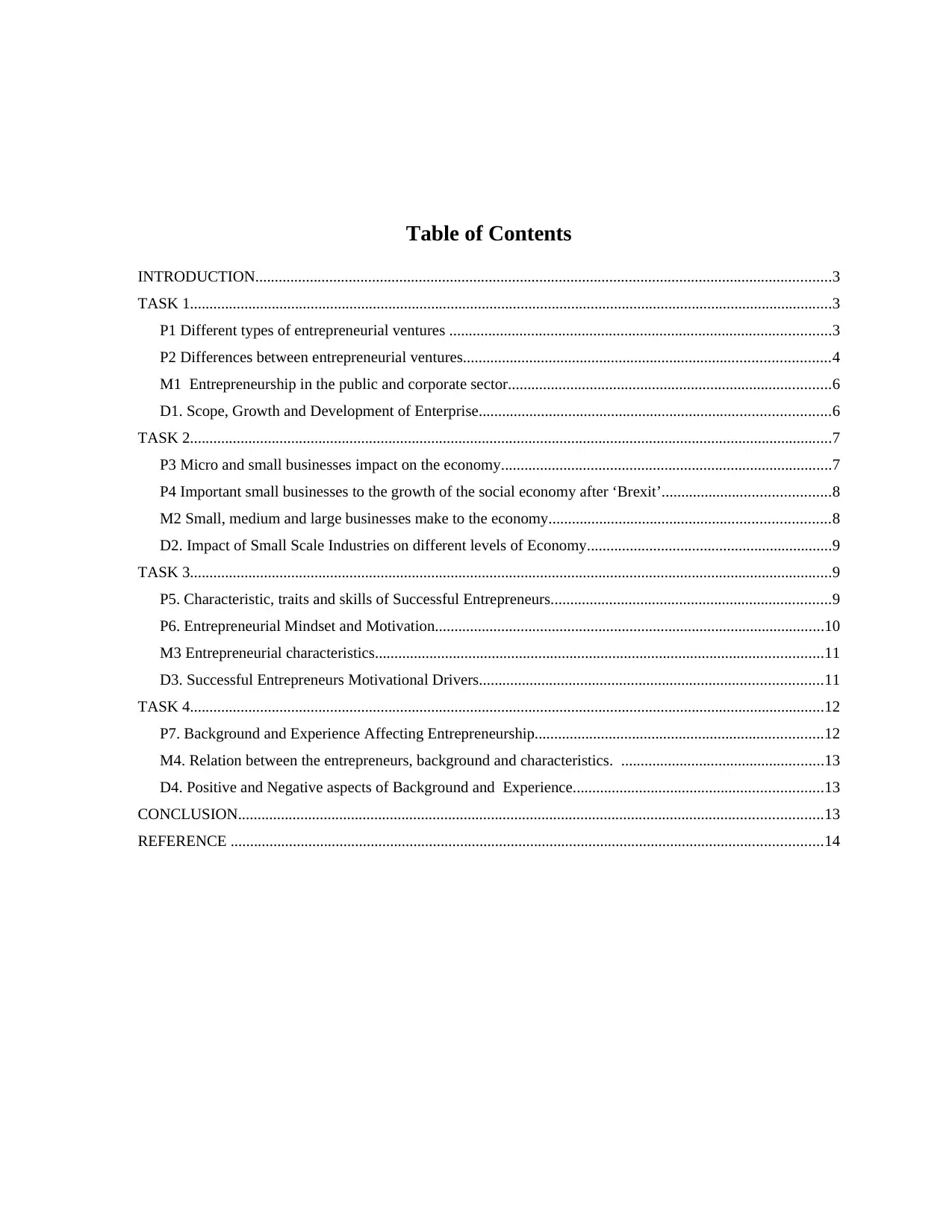
Table of Contents
INTRODUCTION....................................................................................................................................................3
TASK 1.....................................................................................................................................................................3
P1 Different types of entrepreneurial ventures ..................................................................................................3
P2 Differences between entrepreneurial ventures..............................................................................................4
M1 Entrepreneurship in the public and corporate sector...................................................................................6
D1. Scope, Growth and Development of Enterprise..........................................................................................6
TASK 2.....................................................................................................................................................................7
P3 Micro and small businesses impact on the economy.....................................................................................7
P4 Important small businesses to the growth of the social economy after ‘Brexit’...........................................8
M2 Small, medium and large businesses make to the economy........................................................................8
D2. Impact of Small Scale Industries on different levels of Economy...............................................................9
TASK 3.....................................................................................................................................................................9
P5. Characteristic, traits and skills of Successful Entrepreneurs........................................................................9
P6. Entrepreneurial Mindset and Motivation....................................................................................................10
M3 Entrepreneurial characteristics...................................................................................................................11
D3. Successful Entrepreneurs Motivational Drivers........................................................................................11
TASK 4...................................................................................................................................................................12
P7. Background and Experience Affecting Entrepreneurship..........................................................................12
M4. Relation between the entrepreneurs, background and characteristics. ....................................................13
D4. Positive and Negative aspects of Background and Experience................................................................13
CONCLUSION......................................................................................................................................................13
REFERENCE ........................................................................................................................................................14
INTRODUCTION....................................................................................................................................................3
TASK 1.....................................................................................................................................................................3
P1 Different types of entrepreneurial ventures ..................................................................................................3
P2 Differences between entrepreneurial ventures..............................................................................................4
M1 Entrepreneurship in the public and corporate sector...................................................................................6
D1. Scope, Growth and Development of Enterprise..........................................................................................6
TASK 2.....................................................................................................................................................................7
P3 Micro and small businesses impact on the economy.....................................................................................7
P4 Important small businesses to the growth of the social economy after ‘Brexit’...........................................8
M2 Small, medium and large businesses make to the economy........................................................................8
D2. Impact of Small Scale Industries on different levels of Economy...............................................................9
TASK 3.....................................................................................................................................................................9
P5. Characteristic, traits and skills of Successful Entrepreneurs........................................................................9
P6. Entrepreneurial Mindset and Motivation....................................................................................................10
M3 Entrepreneurial characteristics...................................................................................................................11
D3. Successful Entrepreneurs Motivational Drivers........................................................................................11
TASK 4...................................................................................................................................................................12
P7. Background and Experience Affecting Entrepreneurship..........................................................................12
M4. Relation between the entrepreneurs, background and characteristics. ....................................................13
D4. Positive and Negative aspects of Background and Experience................................................................13
CONCLUSION......................................................................................................................................................13
REFERENCE ........................................................................................................................................................14
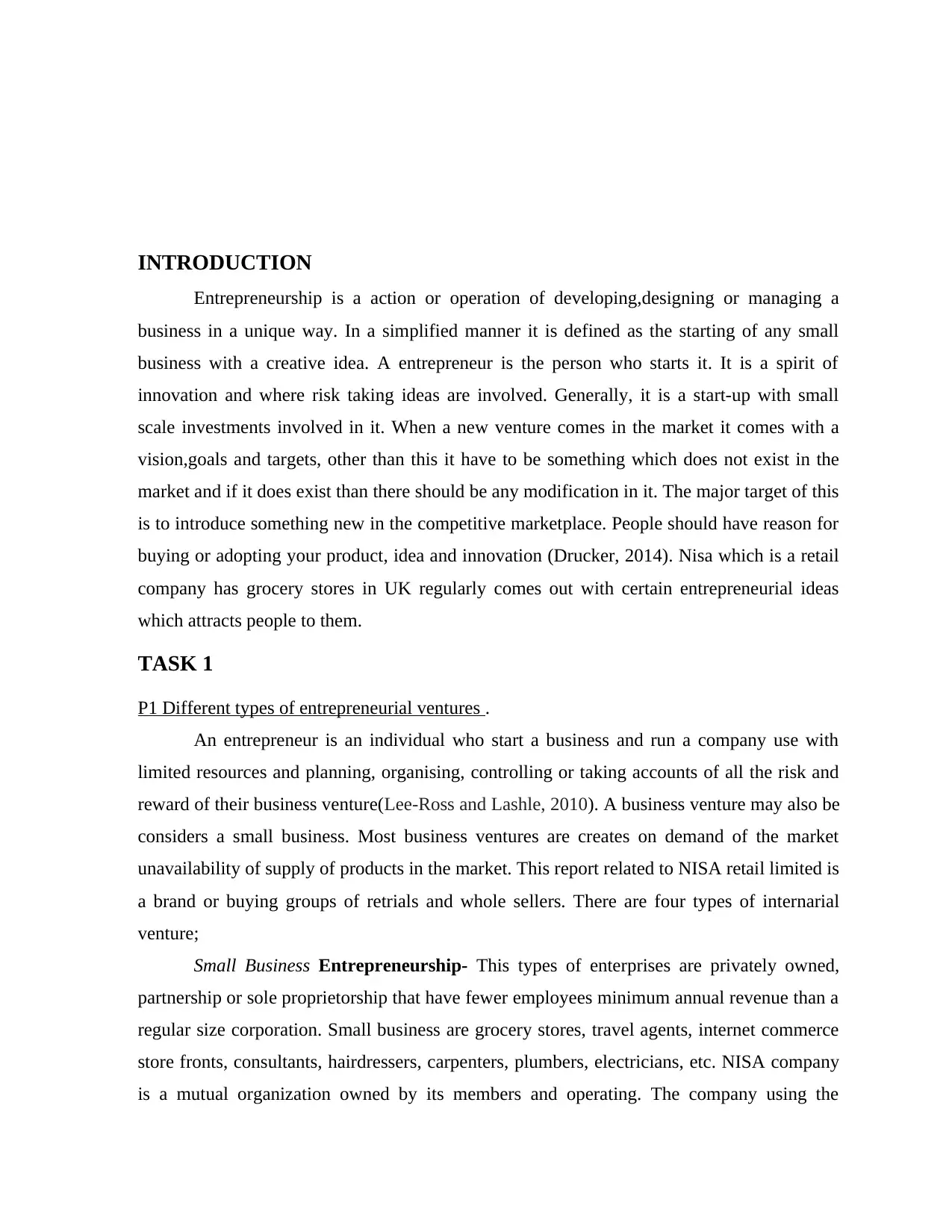
INTRODUCTION
Entrepreneurship is a action or operation of developing,designing or managing a
business in a unique way. In a simplified manner it is defined as the starting of any small
business with a creative idea. A entrepreneur is the person who starts it. It is a spirit of
innovation and where risk taking ideas are involved. Generally, it is a start-up with small
scale investments involved in it. When a new venture comes in the market it comes with a
vision,goals and targets, other than this it have to be something which does not exist in the
market and if it does exist than there should be any modification in it. The major target of this
is to introduce something new in the competitive marketplace. People should have reason for
buying or adopting your product, idea and innovation (Drucker, 2014). Nisa which is a retail
company has grocery stores in UK regularly comes out with certain entrepreneurial ideas
which attracts people to them.
TASK 1
P1 Different types of entrepreneurial ventures .
An entrepreneur is an individual who start a business and run a company use with
limited resources and planning, organising, controlling or taking accounts of all the risk and
reward of their business venture(Lee-Ross and Lashle, 2010). A business venture may also be
considers a small business. Most business ventures are creates on demand of the market
unavailability of supply of products in the market. This report related to NISA retail limited is
a brand or buying groups of retrials and whole sellers. There are four types of internarial
venture;
Small Business Entrepreneurship- This types of enterprises are privately owned,
partnership or sole proprietorship that have fewer employees minimum annual revenue than a
regular size corporation. Small business are grocery stores, travel agents, internet commerce
store fronts, consultants, hairdressers, carpenters, plumbers, electricians, etc. NISA company
is a mutual organization owned by its members and operating. The company using the
Entrepreneurship is a action or operation of developing,designing or managing a
business in a unique way. In a simplified manner it is defined as the starting of any small
business with a creative idea. A entrepreneur is the person who starts it. It is a spirit of
innovation and where risk taking ideas are involved. Generally, it is a start-up with small
scale investments involved in it. When a new venture comes in the market it comes with a
vision,goals and targets, other than this it have to be something which does not exist in the
market and if it does exist than there should be any modification in it. The major target of this
is to introduce something new in the competitive marketplace. People should have reason for
buying or adopting your product, idea and innovation (Drucker, 2014). Nisa which is a retail
company has grocery stores in UK regularly comes out with certain entrepreneurial ideas
which attracts people to them.
TASK 1
P1 Different types of entrepreneurial ventures .
An entrepreneur is an individual who start a business and run a company use with
limited resources and planning, organising, controlling or taking accounts of all the risk and
reward of their business venture(Lee-Ross and Lashle, 2010). A business venture may also be
considers a small business. Most business ventures are creates on demand of the market
unavailability of supply of products in the market. This report related to NISA retail limited is
a brand or buying groups of retrials and whole sellers. There are four types of internarial
venture;
Small Business Entrepreneurship- This types of enterprises are privately owned,
partnership or sole proprietorship that have fewer employees minimum annual revenue than a
regular size corporation. Small business are grocery stores, travel agents, internet commerce
store fronts, consultants, hairdressers, carpenters, plumbers, electricians, etc. NISA company
is a mutual organization owned by its members and operating. The company using the
⊘ This is a preview!⊘
Do you want full access?
Subscribe today to unlock all pages.

Trusted by 1+ million students worldwide
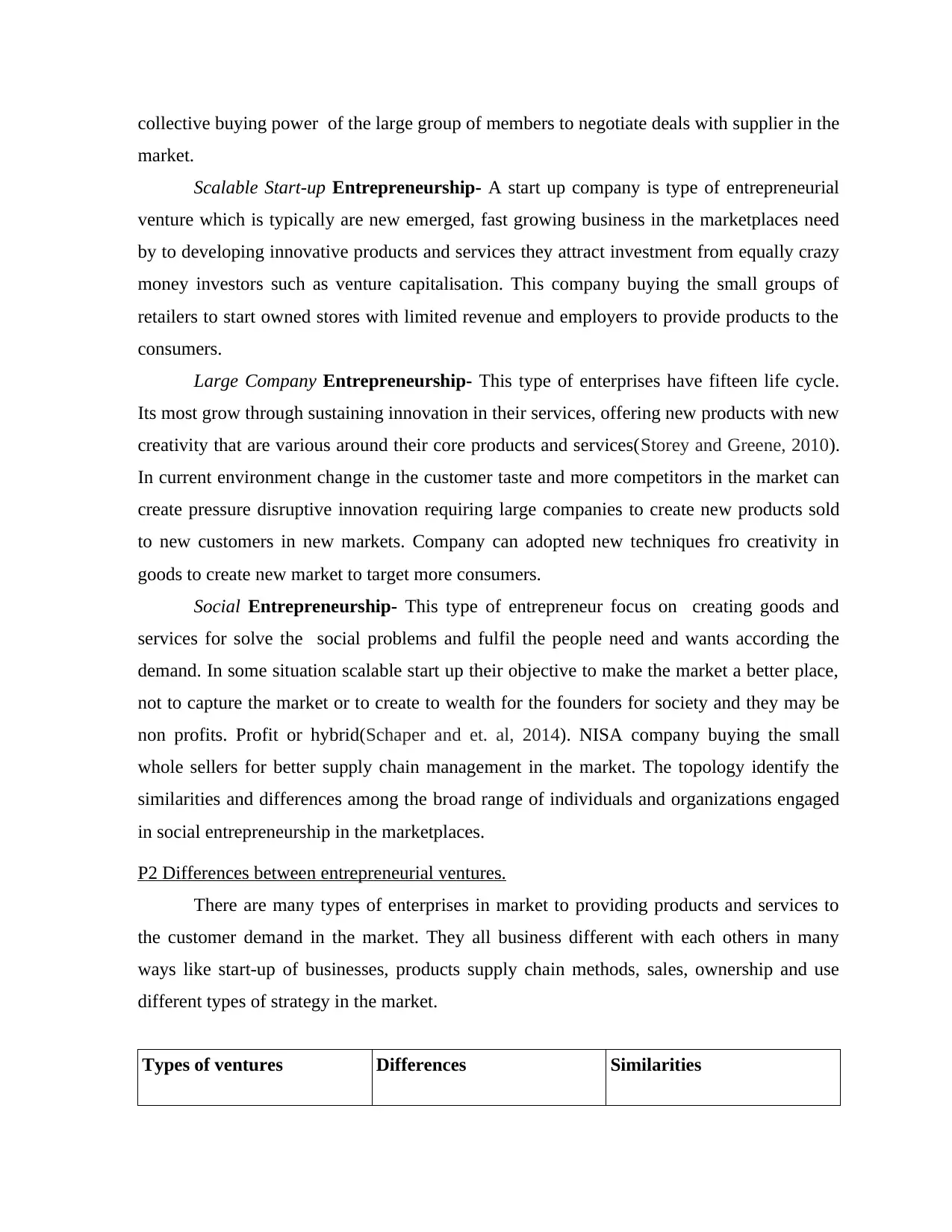
collective buying power of the large group of members to negotiate deals with supplier in the
market.
Scalable Start-up Entrepreneurship- A start up company is type of entrepreneurial
venture which is typically are new emerged, fast growing business in the marketplaces need
by to developing innovative products and services they attract investment from equally crazy
money investors such as venture capitalisation. This company buying the small groups of
retailers to start owned stores with limited revenue and employers to provide products to the
consumers.
Large Company Entrepreneurship- This type of enterprises have fifteen life cycle.
Its most grow through sustaining innovation in their services, offering new products with new
creativity that are various around their core products and services(Storey and Greene, 2010).
In current environment change in the customer taste and more competitors in the market can
create pressure disruptive innovation requiring large companies to create new products sold
to new customers in new markets. Company can adopted new techniques fro creativity in
goods to create new market to target more consumers.
Social Entrepreneurship- This type of entrepreneur focus on creating goods and
services for solve the social problems and fulfil the people need and wants according the
demand. In some situation scalable start up their objective to make the market a better place,
not to capture the market or to create to wealth for the founders for society and they may be
non profits. Profit or hybrid(Schaper and et. al, 2014). NISA company buying the small
whole sellers for better supply chain management in the market. The topology identify the
similarities and differences among the broad range of individuals and organizations engaged
in social entrepreneurship in the marketplaces.
P2 Differences between entrepreneurial ventures.
There are many types of enterprises in market to providing products and services to
the customer demand in the market. They all business different with each others in many
ways like start-up of businesses, products supply chain methods, sales, ownership and use
different types of strategy in the market.
Types of ventures Differences Similarities
market.
Scalable Start-up Entrepreneurship- A start up company is type of entrepreneurial
venture which is typically are new emerged, fast growing business in the marketplaces need
by to developing innovative products and services they attract investment from equally crazy
money investors such as venture capitalisation. This company buying the small groups of
retailers to start owned stores with limited revenue and employers to provide products to the
consumers.
Large Company Entrepreneurship- This type of enterprises have fifteen life cycle.
Its most grow through sustaining innovation in their services, offering new products with new
creativity that are various around their core products and services(Storey and Greene, 2010).
In current environment change in the customer taste and more competitors in the market can
create pressure disruptive innovation requiring large companies to create new products sold
to new customers in new markets. Company can adopted new techniques fro creativity in
goods to create new market to target more consumers.
Social Entrepreneurship- This type of entrepreneur focus on creating goods and
services for solve the social problems and fulfil the people need and wants according the
demand. In some situation scalable start up their objective to make the market a better place,
not to capture the market or to create to wealth for the founders for society and they may be
non profits. Profit or hybrid(Schaper and et. al, 2014). NISA company buying the small
whole sellers for better supply chain management in the market. The topology identify the
similarities and differences among the broad range of individuals and organizations engaged
in social entrepreneurship in the marketplaces.
P2 Differences between entrepreneurial ventures.
There are many types of enterprises in market to providing products and services to
the customer demand in the market. They all business different with each others in many
ways like start-up of businesses, products supply chain methods, sales, ownership and use
different types of strategy in the market.
Types of ventures Differences Similarities
Paraphrase This Document
Need a fresh take? Get an instant paraphrase of this document with our AI Paraphraser
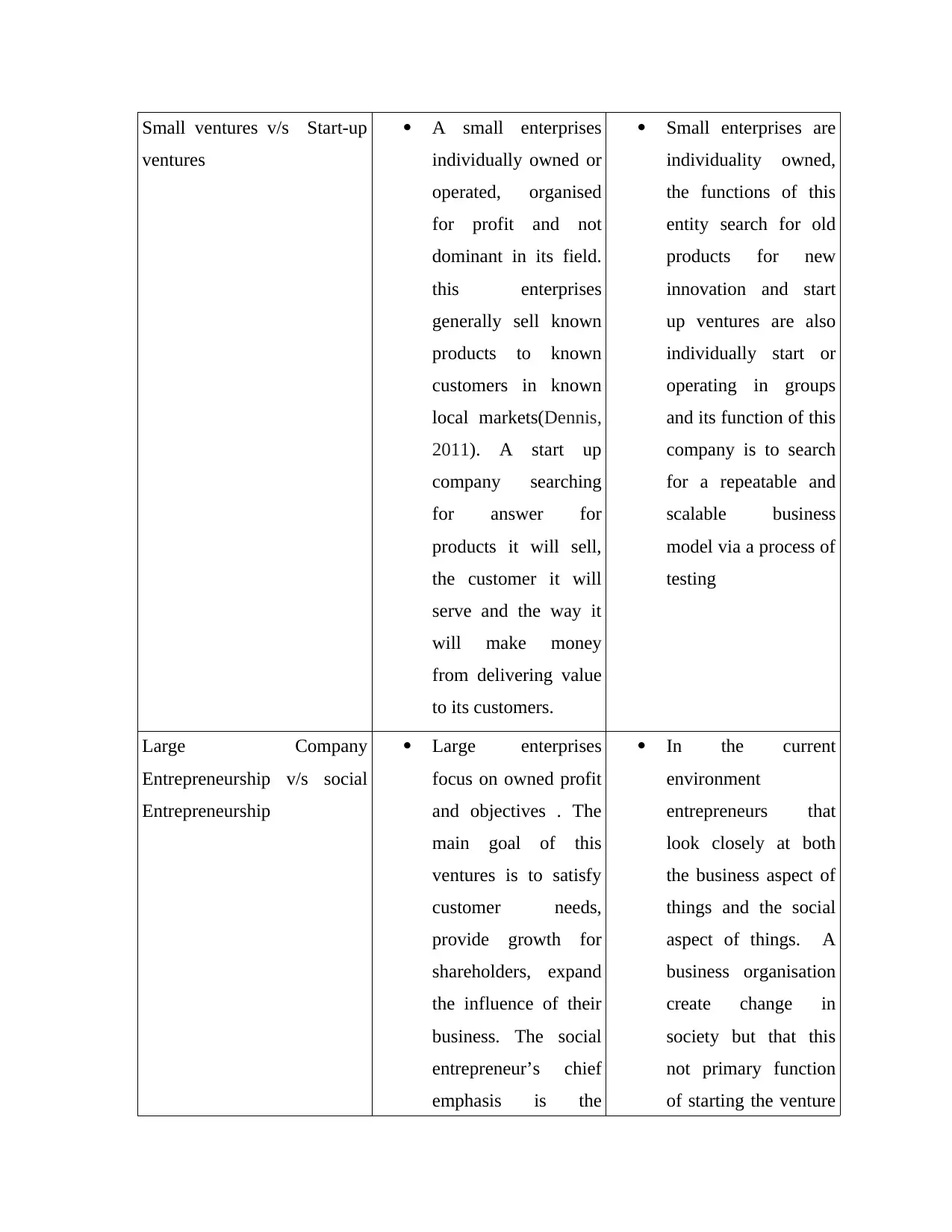
Small ventures v/s Start-up
ventures
A small enterprises
individually owned or
operated, organised
for profit and not
dominant in its field.
this enterprises
generally sell known
products to known
customers in known
local markets(Dennis,
2011). A start up
company searching
for answer for
products it will sell,
the customer it will
serve and the way it
will make money
from delivering value
to its customers.
Small enterprises are
individuality owned,
the functions of this
entity search for old
products for new
innovation and start
up ventures are also
individually start or
operating in groups
and its function of this
company is to search
for a repeatable and
scalable business
model via a process of
testing
Large Company
Entrepreneurship v/s social
Entrepreneurship
Large enterprises
focus on owned profit
and objectives . The
main goal of this
ventures is to satisfy
customer needs,
provide growth for
shareholders, expand
the influence of their
business. The social
entrepreneur’s chief
emphasis is the
In the current
environment
entrepreneurs that
look closely at both
the business aspect of
things and the social
aspect of things. A
business organisation
create change in
society but that this
not primary function
of starting the venture
ventures
A small enterprises
individually owned or
operated, organised
for profit and not
dominant in its field.
this enterprises
generally sell known
products to known
customers in known
local markets(Dennis,
2011). A start up
company searching
for answer for
products it will sell,
the customer it will
serve and the way it
will make money
from delivering value
to its customers.
Small enterprises are
individuality owned,
the functions of this
entity search for old
products for new
innovation and start
up ventures are also
individually start or
operating in groups
and its function of this
company is to search
for a repeatable and
scalable business
model via a process of
testing
Large Company
Entrepreneurship v/s social
Entrepreneurship
Large enterprises
focus on owned profit
and objectives . The
main goal of this
ventures is to satisfy
customer needs,
provide growth for
shareholders, expand
the influence of their
business. The social
entrepreneur’s chief
emphasis is the
In the current
environment
entrepreneurs that
look closely at both
the business aspect of
things and the social
aspect of things. A
business organisation
create change in
society but that this
not primary function
of starting the venture
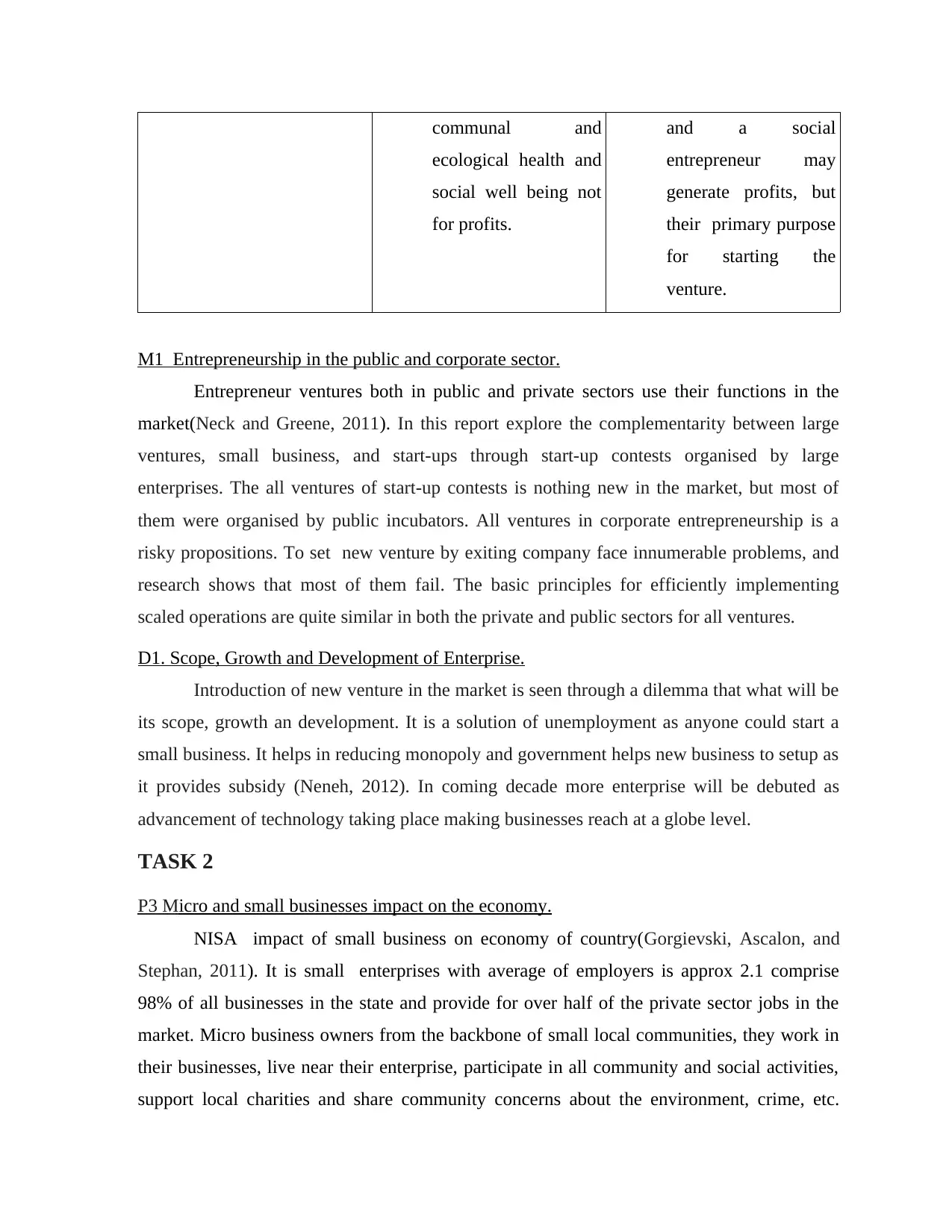
communal and
ecological health and
social well being not
for profits.
and a social
entrepreneur may
generate profits, but
their primary purpose
for starting the
venture.
M1 Entrepreneurship in the public and corporate sector.
Entrepreneur ventures both in public and private sectors use their functions in the
market(Neck and Greene, 2011). In this report explore the complementarity between large
ventures, small business, and start-ups through start-up contests organised by large
enterprises. The all ventures of start-up contests is nothing new in the market, but most of
them were organised by public incubators. All ventures in corporate entrepreneurship is a
risky propositions. To set new venture by exiting company face innumerable problems, and
research shows that most of them fail. The basic principles for efficiently implementing
scaled operations are quite similar in both the private and public sectors for all ventures.
D1. Scope, Growth and Development of Enterprise.
Introduction of new venture in the market is seen through a dilemma that what will be
its scope, growth an development. It is a solution of unemployment as anyone could start a
small business. It helps in reducing monopoly and government helps new business to setup as
it provides subsidy (Neneh, 2012). In coming decade more enterprise will be debuted as
advancement of technology taking place making businesses reach at a globe level.
TASK 2
P3 Micro and small businesses impact on the economy.
NISA impact of small business on economy of country(Gorgievski, Ascalon, and
Stephan, 2011). It is small enterprises with average of employers is approx 2.1 comprise
98% of all businesses in the state and provide for over half of the private sector jobs in the
market. Micro business owners from the backbone of small local communities, they work in
their businesses, live near their enterprise, participate in all community and social activities,
support local charities and share community concerns about the environment, crime, etc.
ecological health and
social well being not
for profits.
and a social
entrepreneur may
generate profits, but
their primary purpose
for starting the
venture.
M1 Entrepreneurship in the public and corporate sector.
Entrepreneur ventures both in public and private sectors use their functions in the
market(Neck and Greene, 2011). In this report explore the complementarity between large
ventures, small business, and start-ups through start-up contests organised by large
enterprises. The all ventures of start-up contests is nothing new in the market, but most of
them were organised by public incubators. All ventures in corporate entrepreneurship is a
risky propositions. To set new venture by exiting company face innumerable problems, and
research shows that most of them fail. The basic principles for efficiently implementing
scaled operations are quite similar in both the private and public sectors for all ventures.
D1. Scope, Growth and Development of Enterprise.
Introduction of new venture in the market is seen through a dilemma that what will be
its scope, growth an development. It is a solution of unemployment as anyone could start a
small business. It helps in reducing monopoly and government helps new business to setup as
it provides subsidy (Neneh, 2012). In coming decade more enterprise will be debuted as
advancement of technology taking place making businesses reach at a globe level.
TASK 2
P3 Micro and small businesses impact on the economy.
NISA impact of small business on economy of country(Gorgievski, Ascalon, and
Stephan, 2011). It is small enterprises with average of employers is approx 2.1 comprise
98% of all businesses in the state and provide for over half of the private sector jobs in the
market. Micro business owners from the backbone of small local communities, they work in
their businesses, live near their enterprise, participate in all community and social activities,
support local charities and share community concerns about the environment, crime, etc.
⊘ This is a preview!⊘
Do you want full access?
Subscribe today to unlock all pages.

Trusted by 1+ million students worldwide
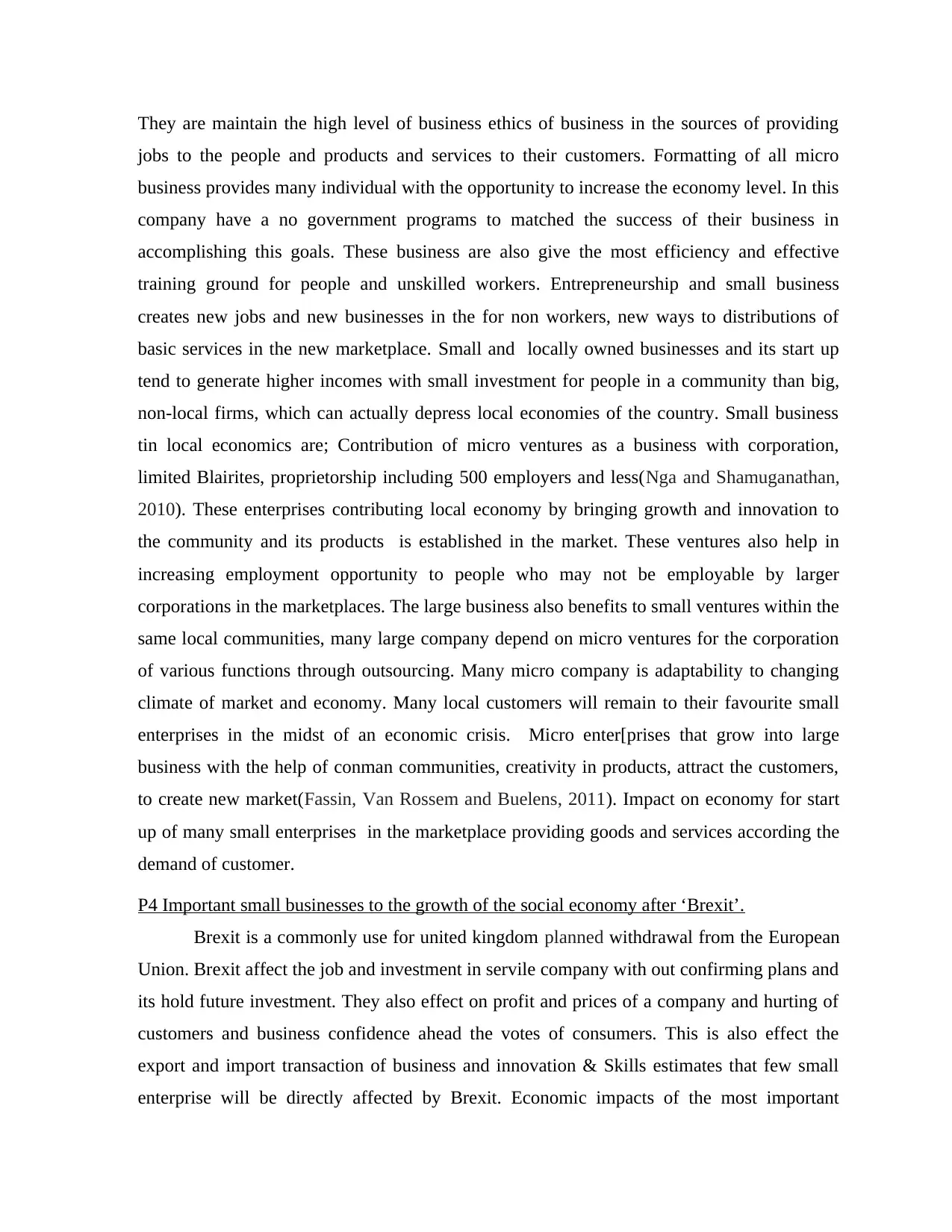
They are maintain the high level of business ethics of business in the sources of providing
jobs to the people and products and services to their customers. Formatting of all micro
business provides many individual with the opportunity to increase the economy level. In this
company have a no government programs to matched the success of their business in
accomplishing this goals. These business are also give the most efficiency and effective
training ground for people and unskilled workers. Entrepreneurship and small business
creates new jobs and new businesses in the for non workers, new ways to distributions of
basic services in the new marketplace. Small and locally owned businesses and its start up
tend to generate higher incomes with small investment for people in a community than big,
non-local firms, which can actually depress local economies of the country. Small business
tin local economics are; Contribution of micro ventures as a business with corporation,
limited Blairites, proprietorship including 500 employers and less(Nga and Shamuganathan,
2010). These enterprises contributing local economy by bringing growth and innovation to
the community and its products is established in the market. These ventures also help in
increasing employment opportunity to people who may not be employable by larger
corporations in the marketplaces. The large business also benefits to small ventures within the
same local communities, many large company depend on micro ventures for the corporation
of various functions through outsourcing. Many micro company is adaptability to changing
climate of market and economy. Many local customers will remain to their favourite small
enterprises in the midst of an economic crisis. Micro enter[prises that grow into large
business with the help of conman communities, creativity in products, attract the customers,
to create new market(Fassin, Van Rossem and Buelens, 2011). Impact on economy for start
up of many small enterprises in the marketplace providing goods and services according the
demand of customer.
P4 Important small businesses to the growth of the social economy after ‘Brexit’.
Brexit is a commonly use for united kingdom planned withdrawal from the European
Union. Brexit affect the job and investment in servile company with out confirming plans and
its hold future investment. They also effect on profit and prices of a company and hurting of
customers and business confidence ahead the votes of consumers. This is also effect the
export and import transaction of business and innovation & Skills estimates that few small
enterprise will be directly affected by Brexit. Economic impacts of the most important
jobs to the people and products and services to their customers. Formatting of all micro
business provides many individual with the opportunity to increase the economy level. In this
company have a no government programs to matched the success of their business in
accomplishing this goals. These business are also give the most efficiency and effective
training ground for people and unskilled workers. Entrepreneurship and small business
creates new jobs and new businesses in the for non workers, new ways to distributions of
basic services in the new marketplace. Small and locally owned businesses and its start up
tend to generate higher incomes with small investment for people in a community than big,
non-local firms, which can actually depress local economies of the country. Small business
tin local economics are; Contribution of micro ventures as a business with corporation,
limited Blairites, proprietorship including 500 employers and less(Nga and Shamuganathan,
2010). These enterprises contributing local economy by bringing growth and innovation to
the community and its products is established in the market. These ventures also help in
increasing employment opportunity to people who may not be employable by larger
corporations in the marketplaces. The large business also benefits to small ventures within the
same local communities, many large company depend on micro ventures for the corporation
of various functions through outsourcing. Many micro company is adaptability to changing
climate of market and economy. Many local customers will remain to their favourite small
enterprises in the midst of an economic crisis. Micro enter[prises that grow into large
business with the help of conman communities, creativity in products, attract the customers,
to create new market(Fassin, Van Rossem and Buelens, 2011). Impact on economy for start
up of many small enterprises in the marketplace providing goods and services according the
demand of customer.
P4 Important small businesses to the growth of the social economy after ‘Brexit’.
Brexit is a commonly use for united kingdom planned withdrawal from the European
Union. Brexit affect the job and investment in servile company with out confirming plans and
its hold future investment. They also effect on profit and prices of a company and hurting of
customers and business confidence ahead the votes of consumers. This is also effect the
export and import transaction of business and innovation & Skills estimates that few small
enterprise will be directly affected by Brexit. Economic impacts of the most important
Paraphrase This Document
Need a fresh take? Get an instant paraphrase of this document with our AI Paraphraser
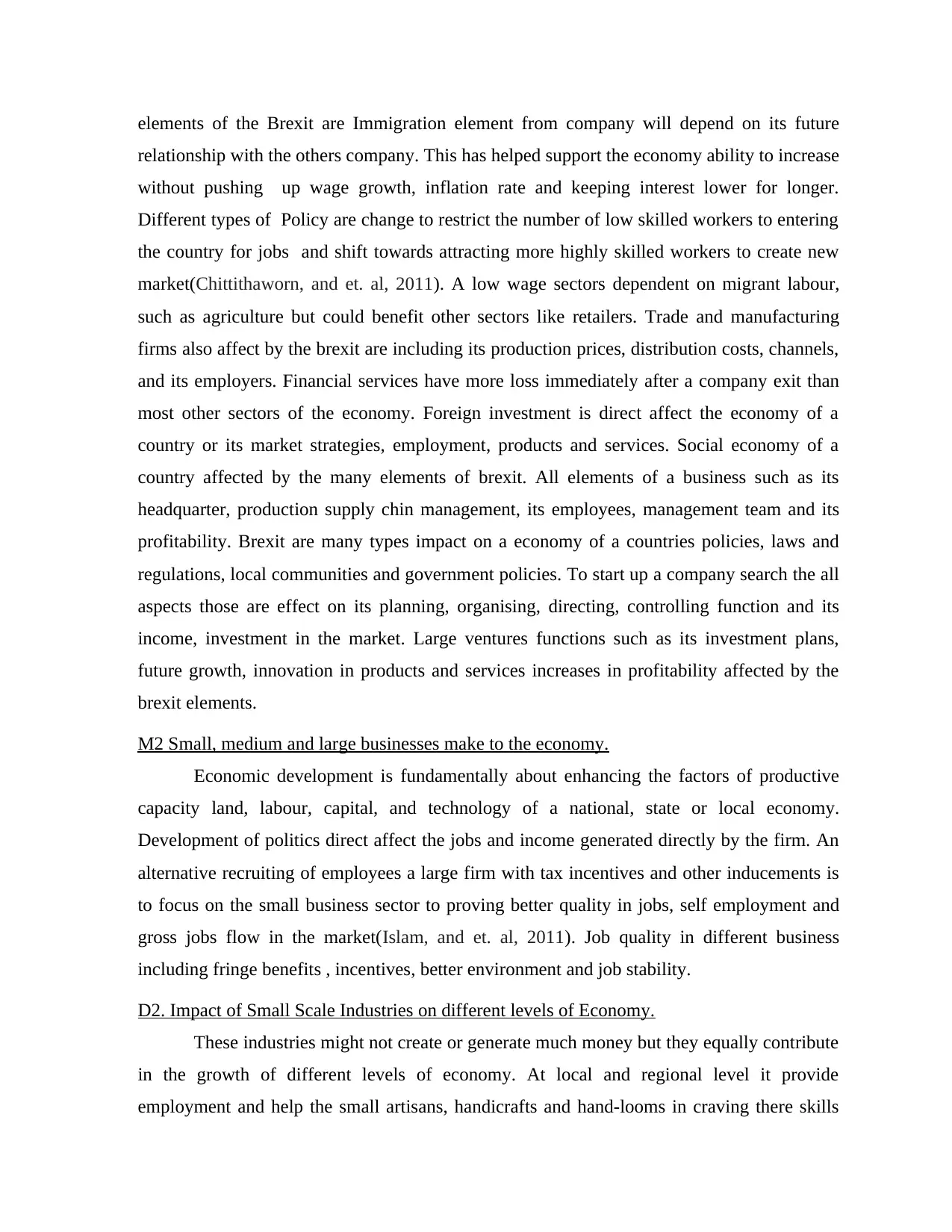
elements of the Brexit are Immigration element from company will depend on its future
relationship with the others company. This has helped support the economy ability to increase
without pushing up wage growth, inflation rate and keeping interest lower for longer.
Different types of Policy are change to restrict the number of low skilled workers to entering
the country for jobs and shift towards attracting more highly skilled workers to create new
market(Chittithaworn, and et. al, 2011). A low wage sectors dependent on migrant labour,
such as agriculture but could benefit other sectors like retailers. Trade and manufacturing
firms also affect by the brexit are including its production prices, distribution costs, channels,
and its employers. Financial services have more loss immediately after a company exit than
most other sectors of the economy. Foreign investment is direct affect the economy of a
country or its market strategies, employment, products and services. Social economy of a
country affected by the many elements of brexit. All elements of a business such as its
headquarter, production supply chin management, its employees, management team and its
profitability. Brexit are many types impact on a economy of a countries policies, laws and
regulations, local communities and government policies. To start up a company search the all
aspects those are effect on its planning, organising, directing, controlling function and its
income, investment in the market. Large ventures functions such as its investment plans,
future growth, innovation in products and services increases in profitability affected by the
brexit elements.
M2 Small, medium and large businesses make to the economy.
Economic development is fundamentally about enhancing the factors of productive
capacity land, labour, capital, and technology of a national, state or local economy.
Development of politics direct affect the jobs and income generated directly by the firm. An
alternative recruiting of employees a large firm with tax incentives and other inducements is
to focus on the small business sector to proving better quality in jobs, self employment and
gross jobs flow in the market(Islam, and et. al, 2011). Job quality in different business
including fringe benefits , incentives, better environment and job stability.
D2. Impact of Small Scale Industries on different levels of Economy.
These industries might not create or generate much money but they equally contribute
in the growth of different levels of economy. At local and regional level it provide
employment and help the small artisans, handicrafts and hand-looms in craving there skills
relationship with the others company. This has helped support the economy ability to increase
without pushing up wage growth, inflation rate and keeping interest lower for longer.
Different types of Policy are change to restrict the number of low skilled workers to entering
the country for jobs and shift towards attracting more highly skilled workers to create new
market(Chittithaworn, and et. al, 2011). A low wage sectors dependent on migrant labour,
such as agriculture but could benefit other sectors like retailers. Trade and manufacturing
firms also affect by the brexit are including its production prices, distribution costs, channels,
and its employers. Financial services have more loss immediately after a company exit than
most other sectors of the economy. Foreign investment is direct affect the economy of a
country or its market strategies, employment, products and services. Social economy of a
country affected by the many elements of brexit. All elements of a business such as its
headquarter, production supply chin management, its employees, management team and its
profitability. Brexit are many types impact on a economy of a countries policies, laws and
regulations, local communities and government policies. To start up a company search the all
aspects those are effect on its planning, organising, directing, controlling function and its
income, investment in the market. Large ventures functions such as its investment plans,
future growth, innovation in products and services increases in profitability affected by the
brexit elements.
M2 Small, medium and large businesses make to the economy.
Economic development is fundamentally about enhancing the factors of productive
capacity land, labour, capital, and technology of a national, state or local economy.
Development of politics direct affect the jobs and income generated directly by the firm. An
alternative recruiting of employees a large firm with tax incentives and other inducements is
to focus on the small business sector to proving better quality in jobs, self employment and
gross jobs flow in the market(Islam, and et. al, 2011). Job quality in different business
including fringe benefits , incentives, better environment and job stability.
D2. Impact of Small Scale Industries on different levels of Economy.
These industries might not create or generate much money but they equally contribute
in the growth of different levels of economy. At local and regional level it provide
employment and help the small artisans, handicrafts and hand-looms in craving there skills
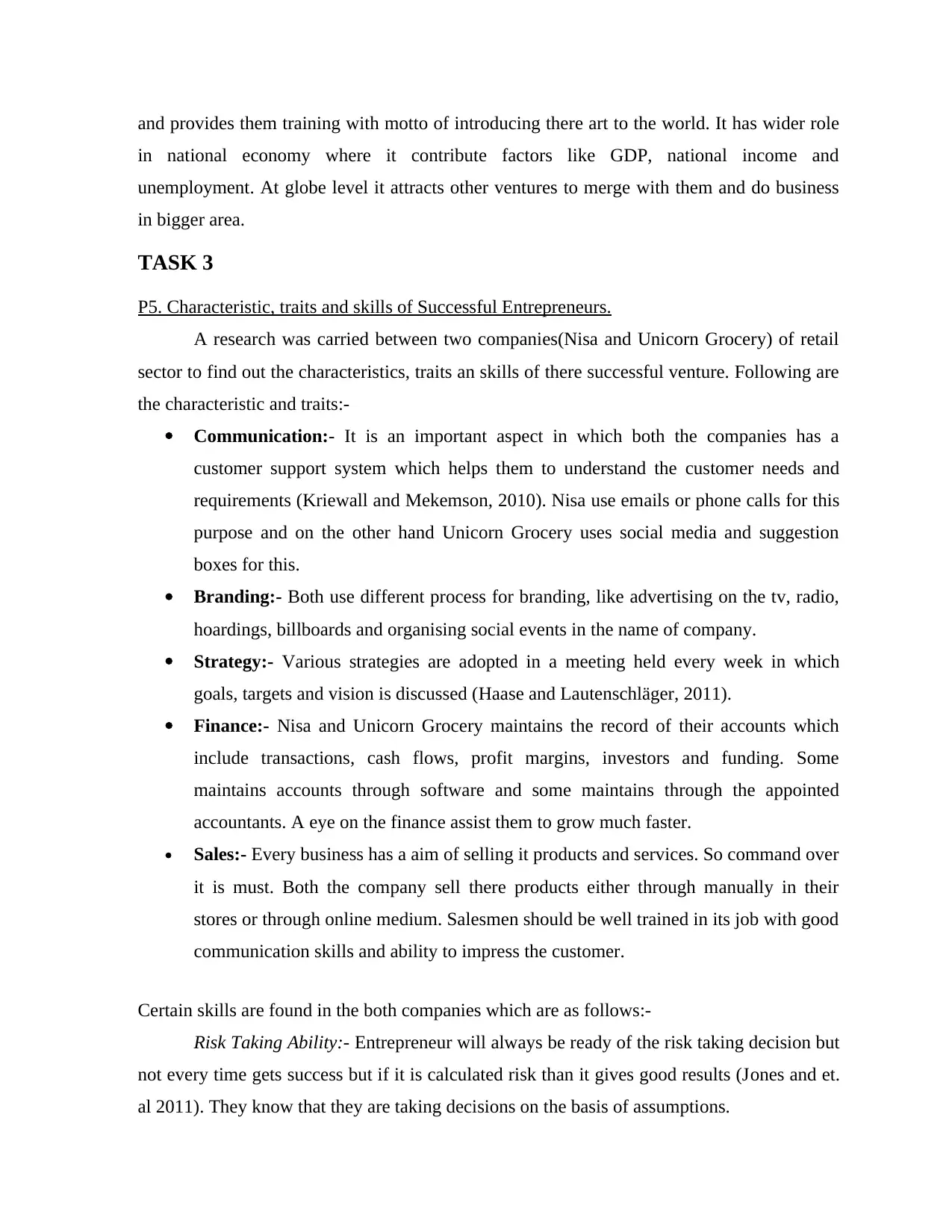
and provides them training with motto of introducing there art to the world. It has wider role
in national economy where it contribute factors like GDP, national income and
unemployment. At globe level it attracts other ventures to merge with them and do business
in bigger area.
TASK 3
P5. Characteristic, traits and skills of Successful Entrepreneurs.
A research was carried between two companies(Nisa and Unicorn Grocery) of retail
sector to find out the characteristics, traits an skills of there successful venture. Following are
the characteristic and traits:-
Communication:- It is an important aspect in which both the companies has a
customer support system which helps them to understand the customer needs and
requirements (Kriewall and Mekemson, 2010). Nisa use emails or phone calls for this
purpose and on the other hand Unicorn Grocery uses social media and suggestion
boxes for this.
Branding:- Both use different process for branding, like advertising on the tv, radio,
hoardings, billboards and organising social events in the name of company.
Strategy:- Various strategies are adopted in a meeting held every week in which
goals, targets and vision is discussed (Haase and Lautenschläger, 2011).
Finance:- Nisa and Unicorn Grocery maintains the record of their accounts which
include transactions, cash flows, profit margins, investors and funding. Some
maintains accounts through software and some maintains through the appointed
accountants. A eye on the finance assist them to grow much faster.
Sales:- Every business has a aim of selling it products and services. So command over
it is must. Both the company sell there products either through manually in their
stores or through online medium. Salesmen should be well trained in its job with good
communication skills and ability to impress the customer.
Certain skills are found in the both companies which are as follows:-
Risk Taking Ability:- Entrepreneur will always be ready of the risk taking decision but
not every time gets success but if it is calculated risk than it gives good results (Jones and et.
al 2011). They know that they are taking decisions on the basis of assumptions.
in national economy where it contribute factors like GDP, national income and
unemployment. At globe level it attracts other ventures to merge with them and do business
in bigger area.
TASK 3
P5. Characteristic, traits and skills of Successful Entrepreneurs.
A research was carried between two companies(Nisa and Unicorn Grocery) of retail
sector to find out the characteristics, traits an skills of there successful venture. Following are
the characteristic and traits:-
Communication:- It is an important aspect in which both the companies has a
customer support system which helps them to understand the customer needs and
requirements (Kriewall and Mekemson, 2010). Nisa use emails or phone calls for this
purpose and on the other hand Unicorn Grocery uses social media and suggestion
boxes for this.
Branding:- Both use different process for branding, like advertising on the tv, radio,
hoardings, billboards and organising social events in the name of company.
Strategy:- Various strategies are adopted in a meeting held every week in which
goals, targets and vision is discussed (Haase and Lautenschläger, 2011).
Finance:- Nisa and Unicorn Grocery maintains the record of their accounts which
include transactions, cash flows, profit margins, investors and funding. Some
maintains accounts through software and some maintains through the appointed
accountants. A eye on the finance assist them to grow much faster.
Sales:- Every business has a aim of selling it products and services. So command over
it is must. Both the company sell there products either through manually in their
stores or through online medium. Salesmen should be well trained in its job with good
communication skills and ability to impress the customer.
Certain skills are found in the both companies which are as follows:-
Risk Taking Ability:- Entrepreneur will always be ready of the risk taking decision but
not every time gets success but if it is calculated risk than it gives good results (Jones and et.
al 2011). They know that they are taking decisions on the basis of assumptions.
⊘ This is a preview!⊘
Do you want full access?
Subscribe today to unlock all pages.

Trusted by 1+ million students worldwide
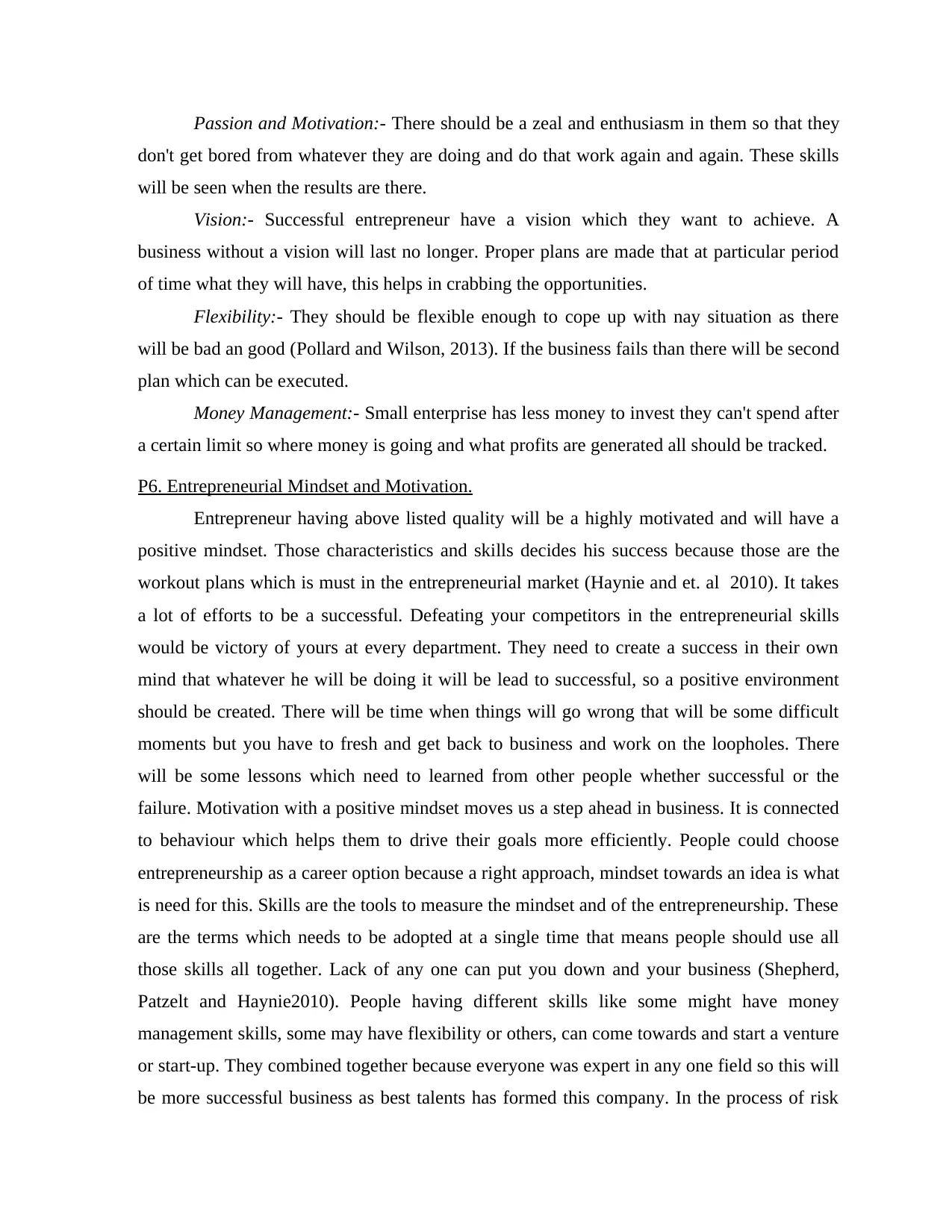
Passion and Motivation:- There should be a zeal and enthusiasm in them so that they
don't get bored from whatever they are doing and do that work again and again. These skills
will be seen when the results are there.
Vision:- Successful entrepreneur have a vision which they want to achieve. A
business without a vision will last no longer. Proper plans are made that at particular period
of time what they will have, this helps in crabbing the opportunities.
Flexibility:- They should be flexible enough to cope up with nay situation as there
will be bad an good (Pollard and Wilson, 2013). If the business fails than there will be second
plan which can be executed.
Money Management:- Small enterprise has less money to invest they can't spend after
a certain limit so where money is going and what profits are generated all should be tracked.
P6. Entrepreneurial Mindset and Motivation.
Entrepreneur having above listed quality will be a highly motivated and will have a
positive mindset. Those characteristics and skills decides his success because those are the
workout plans which is must in the entrepreneurial market (Haynie and et. al 2010). It takes
a lot of efforts to be a successful. Defeating your competitors in the entrepreneurial skills
would be victory of yours at every department. They need to create a success in their own
mind that whatever he will be doing it will be lead to successful, so a positive environment
should be created. There will be time when things will go wrong that will be some difficult
moments but you have to fresh and get back to business and work on the loopholes. There
will be some lessons which need to learned from other people whether successful or the
failure. Motivation with a positive mindset moves us a step ahead in business. It is connected
to behaviour which helps them to drive their goals more efficiently. People could choose
entrepreneurship as a career option because a right approach, mindset towards an idea is what
is need for this. Skills are the tools to measure the mindset and of the entrepreneurship. These
are the terms which needs to be adopted at a single time that means people should use all
those skills all together. Lack of any one can put you down and your business (Shepherd,
Patzelt and Haynie2010). People having different skills like some might have money
management skills, some may have flexibility or others, can come towards and start a venture
or start-up. They combined together because everyone was expert in any one field so this will
be more successful business as best talents has formed this company. In the process of risk
don't get bored from whatever they are doing and do that work again and again. These skills
will be seen when the results are there.
Vision:- Successful entrepreneur have a vision which they want to achieve. A
business without a vision will last no longer. Proper plans are made that at particular period
of time what they will have, this helps in crabbing the opportunities.
Flexibility:- They should be flexible enough to cope up with nay situation as there
will be bad an good (Pollard and Wilson, 2013). If the business fails than there will be second
plan which can be executed.
Money Management:- Small enterprise has less money to invest they can't spend after
a certain limit so where money is going and what profits are generated all should be tracked.
P6. Entrepreneurial Mindset and Motivation.
Entrepreneur having above listed quality will be a highly motivated and will have a
positive mindset. Those characteristics and skills decides his success because those are the
workout plans which is must in the entrepreneurial market (Haynie and et. al 2010). It takes
a lot of efforts to be a successful. Defeating your competitors in the entrepreneurial skills
would be victory of yours at every department. They need to create a success in their own
mind that whatever he will be doing it will be lead to successful, so a positive environment
should be created. There will be time when things will go wrong that will be some difficult
moments but you have to fresh and get back to business and work on the loopholes. There
will be some lessons which need to learned from other people whether successful or the
failure. Motivation with a positive mindset moves us a step ahead in business. It is connected
to behaviour which helps them to drive their goals more efficiently. People could choose
entrepreneurship as a career option because a right approach, mindset towards an idea is what
is need for this. Skills are the tools to measure the mindset and of the entrepreneurship. These
are the terms which needs to be adopted at a single time that means people should use all
those skills all together. Lack of any one can put you down and your business (Shepherd,
Patzelt and Haynie2010). People having different skills like some might have money
management skills, some may have flexibility or others, can come towards and start a venture
or start-up. They combined together because everyone was expert in any one field so this will
be more successful business as best talents has formed this company. In the process of risk
Paraphrase This Document
Need a fresh take? Get an instant paraphrase of this document with our AI Paraphraser
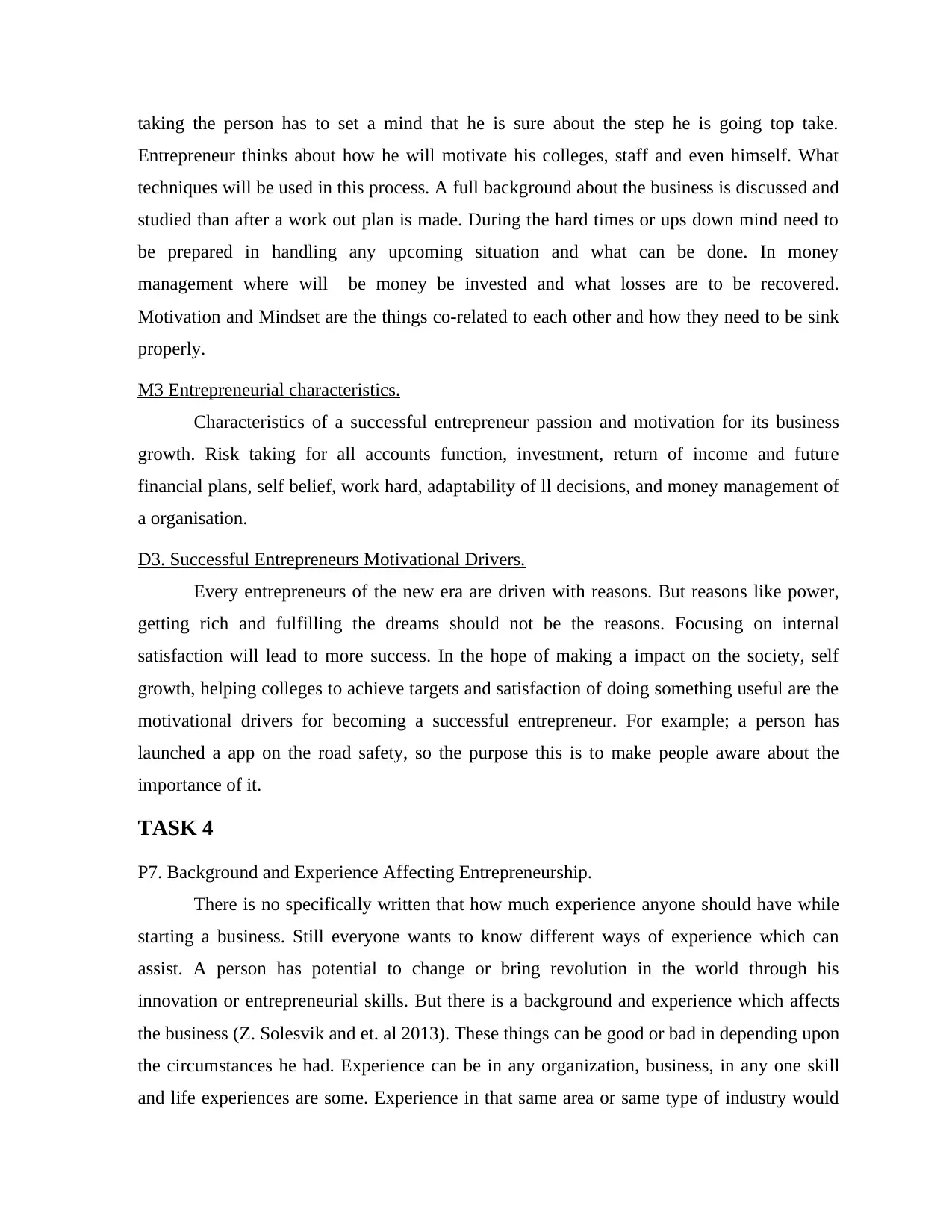
taking the person has to set a mind that he is sure about the step he is going top take.
Entrepreneur thinks about how he will motivate his colleges, staff and even himself. What
techniques will be used in this process. A full background about the business is discussed and
studied than after a work out plan is made. During the hard times or ups down mind need to
be prepared in handling any upcoming situation and what can be done. In money
management where will be money be invested and what losses are to be recovered.
Motivation and Mindset are the things co-related to each other and how they need to be sink
properly.
M3 Entrepreneurial characteristics.
Characteristics of a successful entrepreneur passion and motivation for its business
growth. Risk taking for all accounts function, investment, return of income and future
financial plans, self belief, work hard, adaptability of ll decisions, and money management of
a organisation.
D3. Successful Entrepreneurs Motivational Drivers.
Every entrepreneurs of the new era are driven with reasons. But reasons like power,
getting rich and fulfilling the dreams should not be the reasons. Focusing on internal
satisfaction will lead to more success. In the hope of making a impact on the society, self
growth, helping colleges to achieve targets and satisfaction of doing something useful are the
motivational drivers for becoming a successful entrepreneur. For example; a person has
launched a app on the road safety, so the purpose this is to make people aware about the
importance of it.
TASK 4
P7. Background and Experience Affecting Entrepreneurship.
There is no specifically written that how much experience anyone should have while
starting a business. Still everyone wants to know different ways of experience which can
assist. A person has potential to change or bring revolution in the world through his
innovation or entrepreneurial skills. But there is a background and experience which affects
the business (Z. Solesvik and et. al 2013). These things can be good or bad in depending upon
the circumstances he had. Experience can be in any organization, business, in any one skill
and life experiences are some. Experience in that same area or same type of industry would
Entrepreneur thinks about how he will motivate his colleges, staff and even himself. What
techniques will be used in this process. A full background about the business is discussed and
studied than after a work out plan is made. During the hard times or ups down mind need to
be prepared in handling any upcoming situation and what can be done. In money
management where will be money be invested and what losses are to be recovered.
Motivation and Mindset are the things co-related to each other and how they need to be sink
properly.
M3 Entrepreneurial characteristics.
Characteristics of a successful entrepreneur passion and motivation for its business
growth. Risk taking for all accounts function, investment, return of income and future
financial plans, self belief, work hard, adaptability of ll decisions, and money management of
a organisation.
D3. Successful Entrepreneurs Motivational Drivers.
Every entrepreneurs of the new era are driven with reasons. But reasons like power,
getting rich and fulfilling the dreams should not be the reasons. Focusing on internal
satisfaction will lead to more success. In the hope of making a impact on the society, self
growth, helping colleges to achieve targets and satisfaction of doing something useful are the
motivational drivers for becoming a successful entrepreneur. For example; a person has
launched a app on the road safety, so the purpose this is to make people aware about the
importance of it.
TASK 4
P7. Background and Experience Affecting Entrepreneurship.
There is no specifically written that how much experience anyone should have while
starting a business. Still everyone wants to know different ways of experience which can
assist. A person has potential to change or bring revolution in the world through his
innovation or entrepreneurial skills. But there is a background and experience which affects
the business (Z. Solesvik and et. al 2013). These things can be good or bad in depending upon
the circumstances he had. Experience can be in any organization, business, in any one skill
and life experiences are some. Experience in that same area or same type of industry would
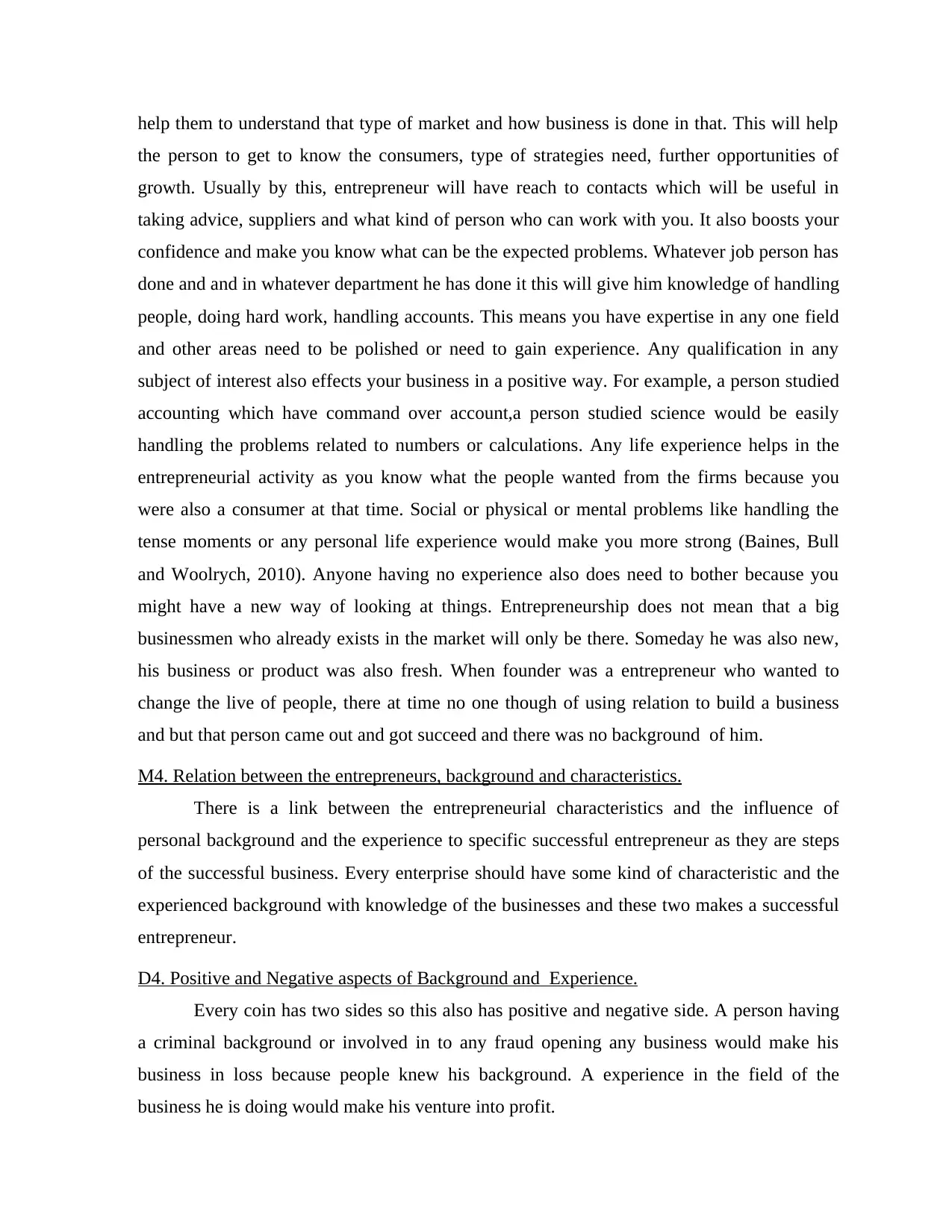
help them to understand that type of market and how business is done in that. This will help
the person to get to know the consumers, type of strategies need, further opportunities of
growth. Usually by this, entrepreneur will have reach to contacts which will be useful in
taking advice, suppliers and what kind of person who can work with you. It also boosts your
confidence and make you know what can be the expected problems. Whatever job person has
done and and in whatever department he has done it this will give him knowledge of handling
people, doing hard work, handling accounts. This means you have expertise in any one field
and other areas need to be polished or need to gain experience. Any qualification in any
subject of interest also effects your business in a positive way. For example, a person studied
accounting which have command over account,a person studied science would be easily
handling the problems related to numbers or calculations. Any life experience helps in the
entrepreneurial activity as you know what the people wanted from the firms because you
were also a consumer at that time. Social or physical or mental problems like handling the
tense moments or any personal life experience would make you more strong (Baines, Bull
and Woolrych, 2010). Anyone having no experience also does need to bother because you
might have a new way of looking at things. Entrepreneurship does not mean that a big
businessmen who already exists in the market will only be there. Someday he was also new,
his business or product was also fresh. When founder was a entrepreneur who wanted to
change the live of people, there at time no one though of using relation to build a business
and but that person came out and got succeed and there was no background of him.
M4. Relation between the entrepreneurs, background and characteristics.
There is a link between the entrepreneurial characteristics and the influence of
personal background and the experience to specific successful entrepreneur as they are steps
of the successful business. Every enterprise should have some kind of characteristic and the
experienced background with knowledge of the businesses and these two makes a successful
entrepreneur.
D4. Positive and Negative aspects of Background and Experience.
Every coin has two sides so this also has positive and negative side. A person having
a criminal background or involved in to any fraud opening any business would make his
business in loss because people knew his background. A experience in the field of the
business he is doing would make his venture into profit.
the person to get to know the consumers, type of strategies need, further opportunities of
growth. Usually by this, entrepreneur will have reach to contacts which will be useful in
taking advice, suppliers and what kind of person who can work with you. It also boosts your
confidence and make you know what can be the expected problems. Whatever job person has
done and and in whatever department he has done it this will give him knowledge of handling
people, doing hard work, handling accounts. This means you have expertise in any one field
and other areas need to be polished or need to gain experience. Any qualification in any
subject of interest also effects your business in a positive way. For example, a person studied
accounting which have command over account,a person studied science would be easily
handling the problems related to numbers or calculations. Any life experience helps in the
entrepreneurial activity as you know what the people wanted from the firms because you
were also a consumer at that time. Social or physical or mental problems like handling the
tense moments or any personal life experience would make you more strong (Baines, Bull
and Woolrych, 2010). Anyone having no experience also does need to bother because you
might have a new way of looking at things. Entrepreneurship does not mean that a big
businessmen who already exists in the market will only be there. Someday he was also new,
his business or product was also fresh. When founder was a entrepreneur who wanted to
change the live of people, there at time no one though of using relation to build a business
and but that person came out and got succeed and there was no background of him.
M4. Relation between the entrepreneurs, background and characteristics.
There is a link between the entrepreneurial characteristics and the influence of
personal background and the experience to specific successful entrepreneur as they are steps
of the successful business. Every enterprise should have some kind of characteristic and the
experienced background with knowledge of the businesses and these two makes a successful
entrepreneur.
D4. Positive and Negative aspects of Background and Experience.
Every coin has two sides so this also has positive and negative side. A person having
a criminal background or involved in to any fraud opening any business would make his
business in loss because people knew his background. A experience in the field of the
business he is doing would make his venture into profit.
⊘ This is a preview!⊘
Do you want full access?
Subscribe today to unlock all pages.

Trusted by 1+ million students worldwide
1 out of 15
Related Documents
Your All-in-One AI-Powered Toolkit for Academic Success.
+13062052269
info@desklib.com
Available 24*7 on WhatsApp / Email
![[object Object]](/_next/static/media/star-bottom.7253800d.svg)
Unlock your academic potential
Copyright © 2020–2026 A2Z Services. All Rights Reserved. Developed and managed by ZUCOL.





